Supreme Court Decision
The recent Supreme Court decision to allocate reserved seats to the Pakistan Tehreek-e-Insaf (PTI) could significantly alter the political landscape of the National Assembly (NA), affecting up to 22 seats.
This change could have substantial ramifications for the composition of the lower house of Parliament and the legislation it enacts.
Currently, these 22 reserved seats are distributed among three major parties: 14 seats are held by the Pakistan Muslim League Nawaz (PMLN), five by the Pakistan Peoples Party (PPP), and three by the Jamiat-e-Ulema Pakistan (JUI-P). If these seats are reallocated to PTI, the party dynamics in the NA will shift considerably.
As it stands, the NA has 313 seats currently notified, with one seat vacant as per the NA Secretariat. Here is the present party position in the NA without the inclusion of the 22 reserved seats:
Government Alliance:
- PMLN: 108
- PPP: 68
- MQM: 22
- PML: 5
- IPP: 4
- PMLZ: 1
- BAP: 1
- NP: 1
Total: 210
Opposition:
- SIC: 84
- Independent (PTI): 8
- JUI-P: 8
- BNP: 1
- MWM: 1
- PKMAP: 1
Total: 103
If PTI manages to secure these 22 reserved seats, it will become the largest party in the NA. By aligning with all 84 members currently associated with SIC, the eight independents, and the 22 newly awarded reserved seats, PTI’s total would rise to 114 seats.
This shift would position PTI as a formidable force in the NA, surpassing the largest party within the government alliance, PMLN, which currently holds 108 seats.
Furthermore, the composition of the governing alliance would be significantly challenged. The governing alliance presently holds 210 seats, far short of the two-thirds majority (224 seats) required to pass major legislation.
With PTI’s potential increase to 114 seats, the balance of power would tilt, complicating the government’s ability to enact laws without substantial negotiation and compromise.
In conclusion, the Supreme Court’s decision to reallocate reserved seats to PTI has the potential to dramatically reshape the National Assembly.
By becoming the largest party, PTI could influence legislative processes and government stability, altering the political dynamics in Pakistan’s lower house of Parliament.
The government’s challenge to achieve a two-thirds majority would become even more arduous, necessitating broader coalitions and more strategic alliances within the NA.


